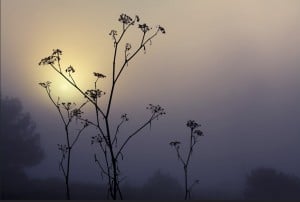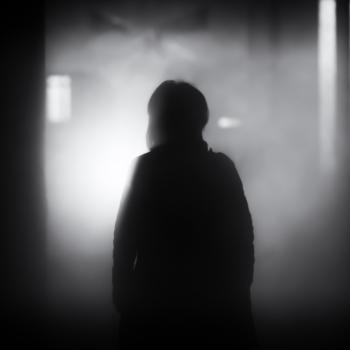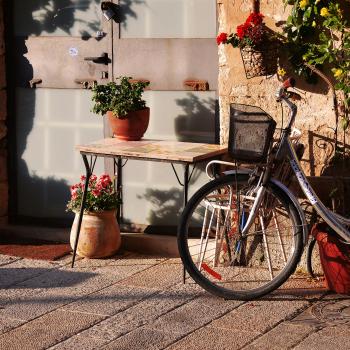T o recap: my cup of Awake is half empty. What’s left is cooler now than when I poured the water from the kettle over the tea bag dangling at the end of its string about twenty minutes ago.
o recap: my cup of Awake is half empty. What’s left is cooler now than when I poured the water from the kettle over the tea bag dangling at the end of its string about twenty minutes ago.
Next to the mailbox, the trash in its thick plastic green container stands ready to be forked into the garbage truck any time now.
It’s Tuesday morning. It’s the last full week of classes. Finals begin next week, but I’m leaving town in less than a week for a seven day silent Jewish meditation retreat. Before I settle onto my meditation bench, close my eyes, and direct my attention to my breath, there’s work to be done.
Upstairs in my study: twenty-one collage-essays from my poetry students, and fifteen collage-essays and fifteen notebooks from my Holocaust and the Arts students. To be graded today, or today and tomorrow, but I can’t take longer than that because portfolios come in from my poetry students tomorrow—
Because Moogfest 2014 begins tomorrow, because on Thursday night I’m taking my Holocaust and the Arts students to see Aftermath and for pizza afterward, because on Friday I have to turn in my grades for both classes—the registrar will open grading specially for me, a one hour window, and close it again until classes are officially over on Monday—
Because I have to pack on Saturday, because I have to drive to Charlotte (two hour drive) to catch a plane on Sunday morning, because I have to—I want to!—visit my stepdaughters and grandson in Manhattan on Sunday, because I have to bounce and babble and talk about interfaith relationships, then…
Ride the Metro North Train because I have to be at the Garrison Institute on Monday afternoon, because I have to set up my meditation bench in the meditation hall and see some old friends and meet some new mindful Jews over dinner before we enter silence—
Because we can awaken the heart, because there is nothing but God or there is nothing and calling it God misrepresents the nothing, O dear Wallace Stevens, that is—
Because the whole semester has come down to this—these final few days of sitting alone with students’ written work—and we ended the semester in a flurry, and we ended a few days early, we suddenly stopped.
Because I could not stop for Death—
He kindly stopped for me—
How courteous! How leisurely, how civil (unless you’re being sarcastic, Emily, but you’d never speak with that tone, dear Emily!) the carriage ride past the school, past fields of grain and the sun. Pausing, then, to behold the burial place—
…a House that seemed
A Swelling of the Ground—
The Roof was scarcely visible—
The Cornice—in the Ground—
But how swift, how astonishing the admission into a different order of time—
Since then—‘tis Centuries—and yet
Feels shorter than the Day
I first surmised the Horses’ Heads
Were toward Eternity—
The intrusion of Death, the interruption of Death: when it comes for me, let it be “civil” and permit me the opportunity to see and see through the busyness of my days, to see through to that from which my busyness averts my eyes, my heart.
In “Detachment,” an essay in his New Seeds of Contemplation, Thomas Merton writes of those who “are attached to activities and enterprises that seem to be important”:
Blinded by their desire for ceaseless motion, for a constant sense of achievement, famished with a crude hunger for results, for visible and tangible success, they work themselves into a state in which they cannot believe that they are pleasing God unless they are busy with a dozen jobs at the same time.
It’s still Tuesday morning. I’m up from the table, into my study, sipping my second cup of tea, reading a little Merton, this very passage, before I sit, before I work—read and comment on and grade their work, my dear students’ work, their prose, their gestures toward poetry.
I direct this, I lead that, I organize the other, I plan and produce and there are too few hours, there are never enough hours, but I am busy doing what I hope is good work, busy trying to please, if not God then whatever or whoever entered me when I was young—I know not exactly when—and whose voice commands me still: produce, produce, if you want to please Me.
But whoever, whatever commands me thus seems never to be pleased and orders me to produce again, produce another, not necessarily better, not even necessarily different.
Commands me: still, be still.
Was I commanded, or did I choose to commit to this upcoming retreat, knowing full well the fevered pitch at which I would be obligated to work in order to arrive on time and ready to sit?
Perhaps, as Yeats writes, “there’s more enterprise in walking naked”—walking, in my case, to the border of the sovereign state of busyness, embroidered busyness, then crossing the border to the state of no phone, no computer, no connectivity, not even any casual chatter between and among the temporary dwellers in the place of stillness.
It’s Tuesday morning. A couple of hours since I opened my eye to the narrow day’s overwhelming list of things to do. I still haven’t crossed off a single item, yet the day already feels spacious, wide enough for wonder.
Richard Chess is the author of three books of poetry, Tekiah, Chair in the Desert, and Third Temple. Poems of his have appeared in Telling and Remembering: A Century of American Jewish Poetry, Bearing the Mystery: Twenty Years of IMAGE, and Best Spiritual Writing 2005. He is the Roy Carroll Professor of Honors Arts and Sciences at the University of North Carolina at Asheville. He is also the director of UNC Asheville’s Center for Jewish Studies.











